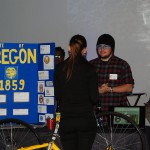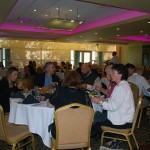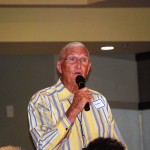The College of Applied Sciences and Arts celebrated the renovation of Yoshihiro Uchida Hall Nov. 7 and honored the man whose name adorns the building.
The festivities included a panel of speakers, taiko drummers, judo demonstrations in the dojo, guided tours of the renovated space that is shared by the College of Applied Sciences and Arts and the Division of Intercollegiate Athletics, and the presentation of a medal for distinguished service from San José State University President Mohammad Qayoumi to Yoshihiro Uchida. The event was hosted by the Office of the President, the College of Applied Sciences and Arts, the Division of Intercollegiate Athletics, University Advancement and the department of Kinesiology.
-

-
Members of San José Taiko perform before the Yoshihiro Uchida Hall re-dedication ceremony on Nov. 7.
-

-
San José State University President Mohammad Qayoumi welcomes guests to the Yoshihiro Uchida Hall Re-dedication ceremony on Nov. 7.
-
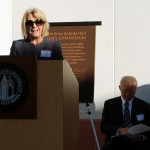
-
College of Applied Sciences and Arts Interim Dean Alice Hines speaks about updated classroom spaces in Yoshihiro Uchida Hall and Uchida’s long connection to the College during the re-dedication ceremony Nov. 7.
-

-
The crowd listens at the Yoshihiro Uchida Hall re-dedication as Michiyasu Sengoku, an SJSU judo alum, Japanese businessman and philanthropist, speaks about the influence Uchida’s coaching had on him when he came to San José as a young man.
-
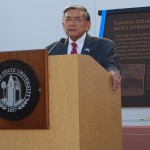
-
The Honorable Norman Mineta, former U.S. Congressman, former U.S. Secretary of Transportation and Commerce, and former San José Mayor, speaks to the crowd about the historical connection between Yoshihiro Uchida Hall and World War II during the re-dedication.
-

-
Yoshihiro Uchida speaks to the crowd at the re-dedication ceremony Nov. 7.
-
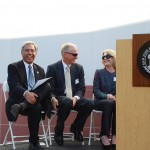
-
Speakers President Mohammad Qayoumi, Director of Athletics Gene Bleymaier and Interim Dean of the College of Applied Sciences and Arts Alice Hines enjoy a laugh as Yoshihiro Uchida talks to the crowd at the re-dedication ceremony Nov. 7.
-

-
Japanese Consul General Masato Watanabe (San Francisco) prepares to present the SJSU judo team with a certificate of recognition at the Yoshihiro Uchida Hall re-dedication Nov. 7.
-
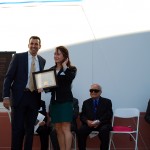
-
San José Mayor-elect Sam Liccardo presents a proclamation from the city to Marti Malloy, an SJSU judo alum and Olympic medalist, at the Yoshihiro Uchida Hall re-dedication Nov. 7.
-

-
The SJSU judo team gathers to received a certificate of recognition from the Japanese Consul General during the Yoshihiro Uchida re-dedication Nov. 7.
-
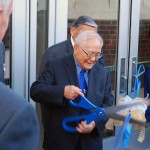
-
Yoshihiro Uchida, center, prepares to cut the ceremonial ribbon at the Yoshihiro Uchida Hall re-dedication Nov. 7, with the panel of guest speakers nearby.
-
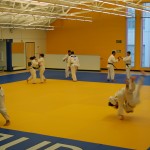
-
Guests watch judo demonstrations during the Yoshihiro Uchida Hall re-dedication Nov. 7.
-
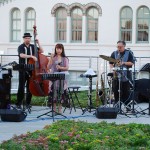
-
Jazz quartet TONE Ensemble plays on the rooftop terrace of Yoshihiro Uchida Hall, following the formal program at the re-dedication Nov. 7.
Namesake
While the event celebrated the reopening of Uchida Hall, one of the primary focuses included honoring Uchida for his long history of service to the campus.
Uchida, ’47 Biological Sciences, has had a long history with San José State University, starting when he enrolled in 1940 as a chemical engineering student. While enrolled, he competed on the wrestling team and coached police students in judo, a sport he started as a 10-year-old in Garden Grove to connect to his family’s Japanese culture. He left the campus for four years, when he was drafted into the U.S. military during World War II while his family members were incarcerated in internment camps in Poston and Tule Lake. The former men’s gymnasium in the then-Spartan Complex West building was used as a registration center for Santa Clara County Japanese and Japanese-American citizens before they were sent to internment camps during World War II. As part of the re-dedication, a plaque will be placed outside the gymnasium to denote its historic significance.
When Uchida returned to campus after WW II, he re-enrolled at SJSU and graduated with a degree in biological sciences in 1947. He continued to teach judo and was instrumental in creating a judo program on campus as well as bringing the sport to national and international attention. Uchida helped to establish a weight class system for judo that allowed it to be practiced as a competitive sport, helping to spread the sport throughout collegiate circles. He also worked to establish judo as a sport in the Amateur Athletic Union.
The first National AAU championships were hosted by San José State in 1953. Uchida was the tournament director. On an international level, he was able to qualify judo as a sport in the Olympics and was the first Olympic judo coach to the United States judo team in 1964 for the Tokyo Olympics. In 2012, he attended his tenth Summer Olympics in London to watch SJSU’s Marti Malloy take bronze.
In addition to his efforts on campus and with judo, Uchida has also contributed to the greater community. He founded the Japanese American Chamber of Silicon Valley in 1996 and serves as Chairman of the Advisory Board; founder of the National Collegiate Judo Association; Chairman of the Japanese American Citizen League Advisory Board; Board of Director for the US Olympic Committee (1996-2000;) President of Uchida Enterprises, Inc.; Chairman Emeritus of the Board of Trustees of the Japanese American National Museum in Southern California; Board of Trustee for the San Jose Chamber of Commerce’s San Jose Metro Chamber of Commerce Political Action Committee; Elected President Emeritus of United States Judo, Inc.; and more.
In 1997, San José State University renamed Spartan Complex West to Yoshihiro Uchida Hall in honor of Uchida’s many years of service to the university and to the community. Uchida received the San José State University Tower Award, in 1992; was inducted into the SJSU Hall of Fame in 1999 and into the SJSU “Legends Hall of Fame” in 2012, to name a few of the honors and awards bestowed on him through the years.
Re-dedication
The festivities on Nov. 7 started off at the North Entrance to YUH, with San José Taiko performing for 15 minutes as the crowd began gathering for the event. Chuck Jefferson, an SJSU judo alum, served as the emcee for the afternoon. The speakers included:
SJSU President Mohammad Qayoumi
Gene Bleymaier, director of athletics
Alice Hines, interim dean for the College of Applied Sciences and Arts
Honorable Norman Mineta, a former U.S. Congressman, former U.S. Secretary of Transportation and Commcerce, and former Mayor of San José
Michiyasu Sengoku, a SJSU judo alum, Japanese businessman and philanthropist
Masato Watanabe, the Japanese general consul, San Francisco
Sam Liccardo, San José District 3 councilman and mayor elect
Matthew Masucci, chair of Kinesiology
Near the end of the ceremony, Qayoumi presented Uchida with the medal for distinguished service, noting that the prestigious award is rarely given and has only been bestowed upon two other people. Uchida kept his own remarks short as he thanked those in attendance, who numbered close to 250. The guest list included distinguished alumni of the judo program, community members, donors, university administrators, faculty from CASA, students and more.
During the ceremony Masucci and Mineta both talked about the history of Yoshihiro Uchida Hall and its connection to World War II. Then known as the Men’s Gymnasium, the building was used as a processing center for Santa Clara County Japanese resident aliens and Japanese-Americans to report for registration into internment camps during World War II. Qayoumi commissioned a plaque to acknowledge the use of the space during World War II. An artist rendering designed by Michelle Frey, of the Office of Marketing and Communications, was on display at the event. The plaque will be fabricated by Nathan Cox, of the SJSU Foundry, and will soon be on display.
As part of the ceremony, Marti Malloy, an SJSU judo alum and Olympic medalist, accepted two proclamations on behalf of the judo team. One was presented from the Japanese Consul General Masato Watanabe and the other from the city of San José, presented by Sam Liccardo, District 3 councilman and recently confirmed as mayor-elect.
At the end of the ceremony, Uchida invited those on stage with him to cut a ceremonial ribbon. Following the formal program, guests were invited to watch judo demonstrations in the dojo/mat room, take a tour of the building with highlights of the renovated spaces, watch video tributes to Uchida in the amphitheater or enjoy a performance by TONE Ensemble, a jazz quartet, on the rooftop terrace while helping themselves to light refreshments.
Renovations
YUH reopened in August for the start of the Fall 2014 semester after a year-long renovation. The $54.7 million bond-financed project includes the renovation of YUH, which cost $27 million, and the renovation of Spartan Complex that is currently under way. From conception of the design to the final construction, the project took two years and five months. The newly renovated space in YUH is shared by the College of Applied Sciences and Arts and the Division of Intercollegiate Athletics, two of the units hosting the re-dedication ceremony with the Office of the President, University Advancement and the department of Kinesiology.
The space has a refurbished mat room that will be used by SJSU Judo, which has a history of training Olympic athletes. The space will be shared with other Kinesiology courses that use floor mats, such as yoga. The building has an amphitheater that is already being used for several large classes this Fall semester and will be used to feature a video tribute to Uchida on the day of the event. On the second floor, the roof of the amphitheater has been designed as a terrace garden that looks out toward Tower Lawn.
The building has an updated weight training classroom, an exercise physiology research lab, stress management lab and classroom, and an updated instructional gymnasium. The building has additional office space that is being used jointly by Kinesiology faculty and staff, along with the Athletics Department.



